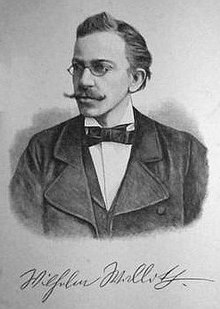Wilhelm Walloth
Wilhelm Walloth (born October 6, 1854 in Darmstadt , † July 8, 1932 in Munich ) was a German writer .
Life
Wilhelm Walloth's parents died early, so that he and his two years younger brother Friedrich grew up as orphans with a childless Hessian couple. Although well protected, Walloth was often ailing. At the age of 17 he also lost his beloved foster mother.
Walloth wrote poetry at an early age, Ludwig Uhland was his great role model . Walloth initially saw his future in painting, but then studied philosophy, aesthetics and literature in Heidelberg. During this time his first poems appeared in book form in 1882. In the following years he turned completely away from painting and wrote his most important historical and contemporary novels and proved his poetic power.
His novels were steeped in naturalism and leading naturalists such as Michael Georg Conrad , Konrad Alberti and Karl Bleibtreu saw in Walloth a renewer of the historical novel. Because of this closeness to the naturalists, the public prosecutor's office discovered his books and in 1890 he and Konrad Alberti and other writers were charged with "indecent writings" in the Leipzig realist trial.
After his studies back in Darmstadt, he was exposed to new hostility. The reason was his friendship with high school student Paul Nodnagel, who had praised Walloth's novels under the pseudonym G. Ludwig in the literary magazine Die Gesellschaft . The precocious and gifted boy died by suicide, and because of Walloth's reputation as an eccentric and his role in the literary process, this death was ascribed to his association with the poet.
A few years later Walloth moved to Munich, where he stayed until the end of his life. There he turned to writing dramas, but these were not received very successfully. The preoccupation with homoerotic love affairs ( Ein Sonderling , Eros ) and a certain pessimism of the author, whose main characters often end in suicide, as well as the bankruptcy of his former publisher Wilhelm Friedrich resulted in a low public awareness of the works.
Walloth's main works Tiberius and Oktavia were reissued in 1917 in the series "Novels of World Literature" by the Hesse & Becker publishing house. The poet lost his prosperity due to the inflation after the First World War and he was dependent on the help of well-meaning people. In the last years of his life he occupied himself with the theosophy of Rudolf Steiner .
Wilhelm Walloth continued to write until his death in 1932, but he was almost forgotten and many of his manuscripts from this period were lost.
Works
- 1882: poems
- 1883: The King's Treasury (novel)
- 1885: Oktavia (novel)
- 1886: Paris, the Mime (novel)
- 1886: Soul riddle (novel)
- 1887: From practice (novel)
- 1888: Am Starnberger See (story)
- 1888: The Gladiator (novel)
- 1888: Dramas ("Countess Pustela", "Johann v. Schwaben", "Marino Falieri")
- 1889: Tiberius (novel)
- 1889: The Demon of Envy (novel)
- 1890: Ovid (novel)
- 1890: collected poems
- 1891: New dramas ("Semiramis", "The Sacrifice", "Alboin")
- 1892: A couple in love (novel)
- 1893: A frost fell ...! (Novel)
- 1894: Fools of Love (short stories)
- 1897: Under the spell of hypnosis (novel)
- 1901: A Nerd (novel)
- 1906: Eros (novel)
- 1909: In the shadow of death (novel)
- 1909: The New Savior (novel)
- 1911: Walloth Museum (poems, 2 vol.)
- 1924: The Crown of Queen Zenobia (travel story)
- 1927: Socrates (drama)
- 1928: a strange passion
- 1929: Sappho and Lydia (play in 4 acts)
literature
- Conrad Alberti: The modern realism in the German literature and the limit of its justification. 1889.
- Hermann Bahr : Overcoming naturalism (the old and the young) , essays. 1891.
- Arno Holz : Art, its essence and its laws. 1891.
- Carl Gustav Vollmöller : The Sturm und Drang period and modern German realism. 1897.
- Ella Mensch: Wilhelm Walloth , in Das literäre Echo , No. 24, 1899.
- Wilh. Walloth in the Brockhaus from 1911 (there with the year of birth 1856)
- Erhard Wendelberger: The epic work of Wilhelm Walloth. A contribution to the history of early naturalism. 1953
- Günter Helmes : Literature and censorship at the beginning of the "modern age". The Leipzig "Realist Trial" 1890. In: Helga Andresen , Matthias Bauer (Ed.): Sprachkultur. Carl Böschen Verlag, Siegen 2009, ISBN 978-3-932212-75-8 , pp. 171-179.
Web links
- Literature by and about Wilhelm Walloth in the catalog of the German National Library
- Works by Wilhelm Walloth in the Gutenberg-DE project
| personal data | |
|---|---|
| SURNAME | Walloth, Wilhelm |
| BRIEF DESCRIPTION | German writer |
| DATE OF BIRTH | October 6, 1854 |
| PLACE OF BIRTH | Darmstadt |
| DATE OF DEATH | July 8, 1932 |
| Place of death | Munich |
